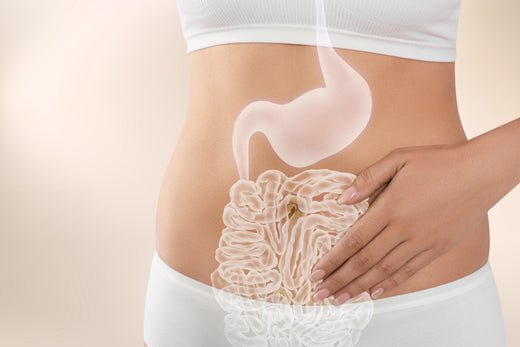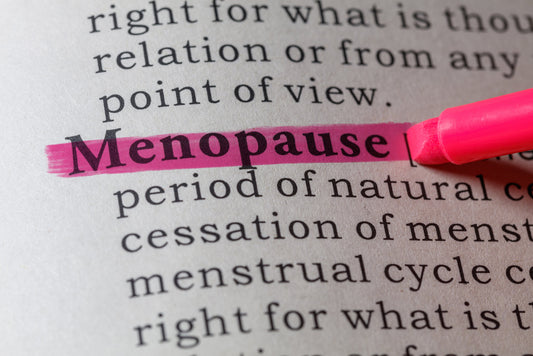Menopause is a natural phase of life, yet it's surrounded by misconceptions that can lead to unnecessary fear and lots of confusion and missed opportunities to prepare for the changes ahead. For many of us, menopause and its symptoms can feel like an unexpected upheaval, but with the right knowledge, it doesn’t have to be that way.
Why is it important to be informed about menopause early?
Understanding menopause, perimenopause, and the associated symptoms well before they arrive can be a game-changer for women’s health. By recognizing the signs of perimenopause early, women can take proactive steps to manage their health, ease symptoms, and reduce the long-term impacts of hormonal changes. Here are a few reasons why early awareness makes a big difference:
- Symptom Management: Early education helps women identify menopause symptoms, such as hot flashes, sleep disturbances, and mood swings as soon as they start showing up, so they can seek effective solutions instead of suffering in silence or worse, getting misdiagnosed.
- Prevention of Long-Term Issues: Knowing about menopause’s impact on bone health, heart health, and metabolism can encourage women to adopt lifestyle changes and consider natural supplements or treatments that can help protect their well-being.
- Empowerment Through Preparation: Women who understand what’s happening in their bodies feel more in control. They’re better equipped to discuss their needs with healthcare providers and make informed decisions about Hormone Replacement Therapy (HRT), menopause supplements, and lifestyle adjustments.
- Reducing Stigma and Fear: Talking about menopause openly helps normalize the experience and dismantle the stigma around it. Women can approach this life stage with confidence rather than dread and help each other get through it.
The earlier we educate ourselves, the more opportunities we have to make choices that align with our individual needs and values. Whether it’s exploring dietary changes, tracking symptoms, or consulting with a healthcare provider, preparation empowers all women to take control of their own menopause journey.
In this blog post, we’ll debunk common myths about menopause, clarify the facts, and provide actionable insights into managing symptoms and navigating this transition with confidence. From understanding the average menopause age to exploring the benefits of menopause supplements and Hormone Replacement Therapy (HRT), we’ll cover everything you need to know to thrive during this natural phase of life.
First things first. What exactly is menopause and how is it different from perimenopause?
Menopause marks the end of a woman’s menstrual cycles, defined as 12 months after her last period. The average menopause age in the U.S. is 51, although it can vary.
Perimenopause, the transitional phase leading up to menopause, can start as early as your 30s or as late as your 50s. The average length of perimenopause is about four years, but it can last up to eight years. This stage is characterized by fluctuating hormones and the onset of menopause symptoms.
Myth #1: Menopause Happens Overnight
Reality: Menopause is a gradual process.
Perimenopause can last 4 to 8 years. During this time, women may experience a long list of unfamiliar symptoms like irregular periods, mood swings, and hot flashes that are caused by fluctuating hormones. The transition doesn’t happen overnight — it’s a slow progression influenced by genetics, lifestyle, and overall health.
Myth #2: Hot Flashes Are the Only Symptom
Reality: Menopause symptoms go beyond hot flashes.
While hot flashes are one of the most recognized signs of menopause, they’re just the tip of the iceberg. There are more than 30 menopause symptoms and we’re always learning about others that may also be influenced by fluctuating hormones. Women may also experience:
- Night sweats
- Sleep disturbances
- Vaginal dryness
- Reduced libido
- Cognitive changes, such as memory lapses
- Brain fog
- Hair thinning
- Bloating
- Weight gain
- Joint pain
Understanding the wide range of symptoms can help women prepare and seek targeted support.
Myth #3: Menopause Age is the Same for Everyone
Reality: Menopause age varies significantly.
While the average menopause age is 51, some women may reach menopause in their early 40s or as late as their late 50s.
Premature menopause, occurring before 40, is rare but possible, and early menopause, between 40 and 45, affects about 5% of women.
Genetics, lifestyle, and health conditions all play a role in determining when menopause begins and knowing your family history can provide clues about when menopause might begin for you.
Myth #4: Hormone Replacement Therapy (HRT) is Dangerous
Reality: Hormone Replacement Therapy (HRT) can be a safe and effective option for many women.
While Hormone Replacement Therapy (HRT) isn't for everyone, it’s a well-researched treatment for menopause symptoms like hot flashes and vaginal dryness. Recent studies suggest that for most women under 60 or within 10 years of menopause, HRT can be a safe option to manage short-term symptoms like hot flashes and help prevent long-term issues like cardiovascular disease and bone loss. However, it’s essential to consult a healthcare provider to discuss the risks and benefits.
Myth #5: Menopause Means the End of Your Youth
Reality: Menopause is a new beginning.
Cultural narratives often portray menopause as the end of vibrancy, but this couldn’t be further from the truth. Many women find this stage of life liberating. Freed from the challenges of menstruation and contraception, many women feel like they can finally shift focus towards personal growth, career goals, and their own wellness.
Myth #6: Perimenopause and Menopause Are the Same
Reality: Perimenopause is a distinct phase before menopause.
Perimenopause is the transition leading up to menopause, during which hormone levels fluctuate. This stage can begin in a woman’s 30s or 40s and may last for several years. Symptoms like irregular periods, mood swings, and hot flashes often appear during this phase, while menopause itself marks the end of menstruation entirely.
Myth #7: You Can’t Get Pregnant During Perimenopause
Reality: Pregnancy is still possible during perimenopause.
Perimenopause is characterized by irregular ovulation, not its complete absence, which means you’re probably still ovulating sporadically during this time. While fertility decreases significantly, it’s still possible to conceive until menopause is confirmed (generally, 12 consecutive months without a period).
What to Do:
If you’re not planning a pregnancy, it’s essential to use contraception during perimenopause. On the other hand, if you are trying to conceive, consult with a fertility specialist to understand your options.
How to Manage Menopause Naturally
While menopause supplements can be helpful, lifestyle changes also play a critical role in symptom management:
-
Exercise Regularly: Weight-bearing exercises like walking or yoga help maintain bone density and reduce stress.
-
Eat a Balanced Diet: Incorporate whole foods rich in protein, healthy fats, and phytoestrogens (e.g., soy, flaxseeds).
-
Prioritize Sleep: Develop a bedtime routine and create a sleep-friendly environment.
-
Practice Stress Management: Yoga, mindfulness, and meditation can ease mood swings and anxiety.
-
Stay Connected: Build a support system to share experiences and advice.
Supplements for Menopause: Do They Work?
Many women turn to menopause supplements to alleviate symptoms. While these are not a cure-all, certain options have shown some promise:
-
Black Cohosh: Often used to help alleviate hot flashes and night sweats.
Calcium and Vitamin D: Crucial for bone health, especially as estrogen levels decline.
-
Magnesium: Supports better sleep and mood regulation.
-
Omega-3 Fatty Acids: Help reduce inflammation, support heart and brain health and may improve mood.
-
Adaptogens (e.g., Ashwagandha): Aid in stress management and help cognitive function.
Always consult a healthcare provider before starting new supplements to ensure they’re safe and appropriate for your needs.
_____
Menopause is a natural life stage, but it doesn’t have to be something to fear. While it comes with physical and emotional changes, it’s important to remember that menopause is manageable, the symptoms are often temporary, and with the right tools, knowledge, and support, you can navigate this transition with confidence.
Understanding the facts about menopause helps break down the myths that can cause unnecessary stress and isolation. When we’re informed about menopause symptoms, perimenopause, and the options available — from lifestyle changes to menopause supplements and treatments — we can feel empowered to take charge of our health.
Menopause Can Be a Catalyst for Growth
This time of change can also be a time of growth. Many women find that as they move through menopause, they gain a sense of clarity, self-acceptance, and freedom. With children growing up or careers reaching a stable point, menopause becomes a time to refocus on self-care, embrace new passions, and redefine intimacy and relationships.
Lean In, Speak Up, and Empower Each Other
The stigma surrounding menopause thrives on silence. Do you remember ever hearing your mother talk about menopause beyond hot flashes? Probably not. But we can change that starting now by sharing our stories and knowledge, we can change the conversation. Talk to your friends, family, and healthcare providers openly about what you’re experiencing. Encourage younger women to learn about menopause early, so they can take proactive steps when the time comes. By lifting each other up and supporting one another, we can create a culture where menopause is seen as a normal, empowering, and transformative stage of life — not something to hide or dread.
BEST supplements are formulated with the most effective, science-backed ingredients out there, and nothing else. No fillers, no false promises, and no B.S.
Just the right doses, delivered the right way, with results that actually matter.
Because your BEST health starts with the BEST standards. And we’re here to deliver both.
*These statements have not been evaluated by the Food and Drug Administration. This product is not intended to diagnose, treat, cure, or prevent any disease.









